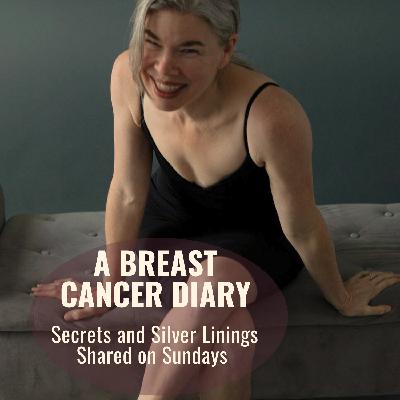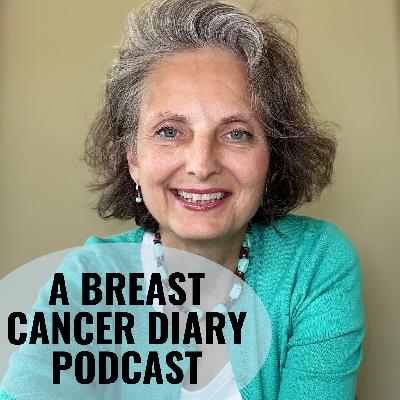A Corporate Professional going through Breast Cancer
Description
My new friend and fellow podcaster, Tina Conrad, is this week's guest and I couldn't wait to hear how she did it. She maintained a high pressure job as a manager in a fast paced fashion corporation right through breast cancer treatment and recovery. She is truly a warrior woman and I'm so thrilled to tell her story here.
Transcript:
Kathleen:
My guest today is Tina Conrad. She's a senior planner at Carhartt, as well as the host of DJ Breast Cancer, another podcast. And she lives in Leesburg, Florida. Her breast cancer was stage 3A. It was ER-PR positive and HER-2 negative. She had both ductal and lobular breast cancer. And like me, she has a mom who has been a breast cancer survivor as well and has gone through that as a long-term survivor, both of them have had at least 11 years—in Tina's case and her mom even more years since any kind of recurrence. And I just wanted to talk to Tina today about what it's been like because I was telling her, I don't know anyone in my life in the breast cancer community here on the West Coast who's been strongly entrenched in the corporate business world and who stayed there throughout their breast cancer story. And she is someone who managed to do that. So I'm kind of in awe of her. I found Tina through the Wildfire Breast Cancer Writing Community and she's a fellow writer there. And I've heard her story mostly through her podcast and she was sweet to offer me a little bit of advice and a mentoring session when I was thinking about doing my podcast. So we know each other a little bit!
Welcome Tina. And please tell us about your journey and how breast cancer entered your life in that corporate business world. What was your role at that time and how did it affect you? How did you exit and reenter? What was that all like for you?
Tina Conrad
Yes. Well, first, let me say hello, Kathleen. It's so good, so good to be here. I've taken a little pause or or a long pause. It's been a few years since I've done any recording, but it's just so great to be back and be a guest and no one else I'd rather be a guest with. So thank you. So, back to, gosh, back to 2013 when I was diagnosed, um I was a DMM, which is Divisional Merchandise Manager at a large retail outlet. um It was truly like my dream job, like we're where I aspired to be, you know, and I had a whole team of people and I was just recently married, um and like life felt really, really awesome, you know like where I just planned to be. and then you know I just stopped one day and kind of took um notice of my health because someone actually on my team had had a health scare, not not breast cancer related, but just had a health scare. And I was like, you know, like this breast of mine, like the nipples sunken in, something doesn't look right. And, you know, I kind of ignored it like for a few months. I was very much an advocate for breast health. I had gotten a mammogram when I was 30, when I was 33 because of my mom, I was very you know into all of that, but she had always had like a lump. And so this was like totally you know something different.
And so having this health scare with someone on my team, I was like, you know, I'm just going to go get this checked out. And, um you know, it was a mammogram and then, you know, they call you back and, you know, you can just kind of sense and read the room that like things aren't really normal. They they weren't like the other times I'd had a mammogram. And so, um you know, that led to um like an ultrasound and then a biopsy. And I woke up from the biopsy and basically the doctor said, get your mom's records.
That was the first thing I remember her saying to me. And so it was just very foreboding. So like I knew um things things weren't going well. So ultimately, yes, I received the diagnosis that you know I had breast cancer and it was pretty advanced on stage 3A lymph node activity. um fifteen I had 15 lymph nodes taken out. um So you know I did opt to get the double mastectomy just with my mom's history. um And then ultimately I did find out too, you know I had lobular which can often jump you know to the other breast too. So I felt very good in my decision you know that I had made um given my you know my family history and everything that had happened. um you know But I was i was busy. like I worked a lot of hours. you know I tried to plan my chemo around like the least intrusive time for work. I was still just very, very career focused. And everything changed. you know like Everything changed. um you know i I had never even taken you know more than maybe one week's time off you know in a row you know in my whole career. So you know with this cancer diagnosis, you know um with with surgery, I took several weeks off. Then with chemo, you know you you get yourself worse and worse. you know like The more you go on, it it's just harder. It's harder on your body to recover.
And there was one night, like I woke up and it came following, ah you know, my my oncologist was really great, really talked to me just like a human being. And he said, you know, who's your advocate at work? And I was like, well, you know, my my boss, you know, she she looks out for me. She does. He's like, no, no, no, no. I'm not talking about your boss. I'm not talking about that. He's like, who is your advocate? And I was like, well, I don't have one. He's like, well, then I seriously need you to consider taking a leave of absence. And I think he was just so black and white in that moment that I needed. And um you know so that was kind of my first taking a step back from work you know and in focusing on myself and you know putting my health first because I had always put my career first. So like that just was who I was. I've definitely changed just in my attitude and viewpoint to work. I still have remained within the corporate world, but I'm no longer like leading big teams, um and I'm happy. And I just have a different viewpoint, I think, on life and you know what is my priorities. And that's okay and it's not to say if ah someone listening there you know keeps going down a path of career, that's great too. But I feel that you know um you do have to put your health for it first. And you're doing it not only for you, but the people that you love. And that just became a different priority through this whole process.
So I was working with Sears Holdings, which was like Kmart Sears, obviously they're no longer no longer in business at the time of my diagnosis. And it was about two years that I had worked there that I just really had a calling that like my my work had to mean more to me. And Vera Bradley had a foundation on that specialized and in breast cancer. And so that was really important to me. in And you know we had so many great opportunities. I saw the foundation like where they do the research. It was so fascinating, you know just all the trials that they were doing. um so So I was really embedded you know not only within Vera Bradley, but you know i I did a lot of volunteer work with the foundation. So I worked there for nearly nine years. And then I just you know recently felt a need and a calling to do, you know again, something different. And so I've been in either merchandising or inventory about half of my career each. And um you know now I have a ah position that allows me to be remote. I've recently moved. um And I get a little bit more in the details of like the work and inventory.
I don't want to sound too much like a nerd, but like I love Excel. I love it. So it's just it kind of gives me a little bit more different purpose. and I'm just really enjoying it. So it's it's just been good for me in terms of like a work-life balance and where I see you know myself and you know just trying to help out too. I have an aging mother-in-law and trying to help you know her more too. So hopefully this puts me in a position where like i can I can do more you know and be more with my family.
Kathleen Moss
At the time of your double mastectomy, how was it going back into the workplace with a new body or a changed body? How was your experience of that change in that corporate setting?
Tina Conrad
Yeah, I think it was less about, you know, like the breast side of it, it was more the hair, you know, like the hair is a big deal. So coming back, I took my leave, you know, after I'd had my mastectomy, I had been through um like 12 rounds of chemo and so my hair was just starting to come back and it was just like that peach fuzz you know real tiny you know hair and I remember going to a store to to work on some kind of project that we were doing and a customer came up to me and she was like I really love your hair and it was just like such a sweet moment that like you never know what a compliment can mean to you. But that in that moment, I know what a compliment meant to me. you know and And I could have gone into, like oh, I just had cancer, all this, all that. you know Oh, really, it looks crazy. you know But I was just like, I stopped. And I looked to her. And I was like, thank you so much. you know like And it just was really,







